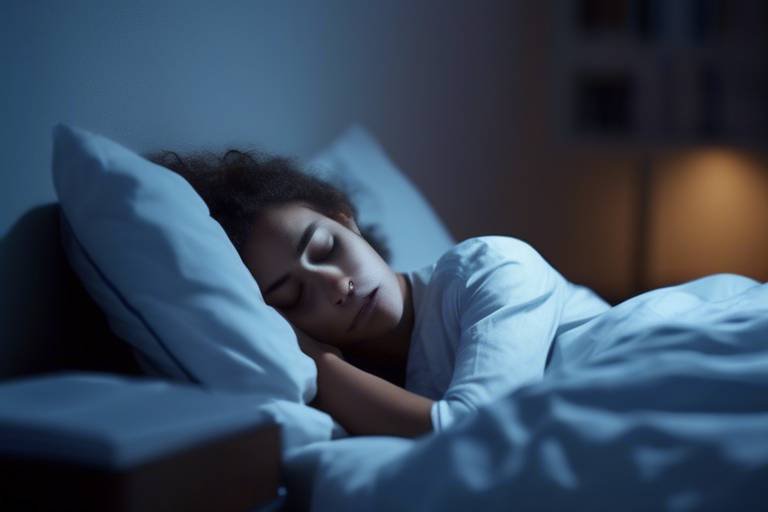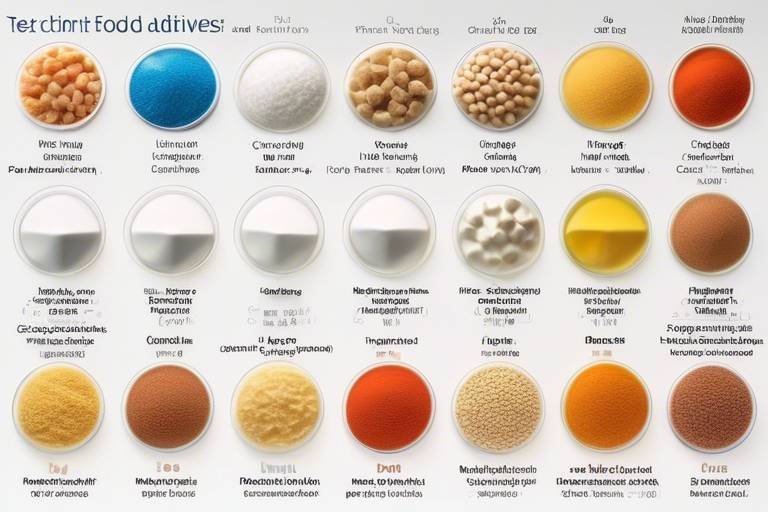The Role of Sleep in Cognitive Function - The Science Explained
Have you ever wondered why you feel foggy after a sleepless night? Or why that brilliant idea hits you right after you wake up? The intricate relationship between sleep and cognitive functions is a fascinating subject that impacts our daily lives more than we might realize. Sleep isn’t just a time for our bodies to rest; it’s a vital process that plays a critical role in how we think, learn, and remember. In this article, we will explore the science behind sleep and its profound effects on memory, attention, learning, and overall brain health.
Imagine your brain as a filing cabinet. During the day, you gather information—facts, experiences, and skills. But how does that information get organized and stored? This is where sleep comes into play. Sleep is crucial for memory consolidation, a process that transforms short-term memories into long-term storage. During sleep, especially during the deep stages, your brain sorts through the information gathered throughout the day, deciding what to keep and what to discard. This transformation enhances our ability to recall information later, making adequate sleep essential for effective learning.
Have you ever tried to concentrate on a task after a night of tossing and turning? It’s like trying to drive a car with a foggy windshield. Adequate sleep is essential for maintaining attention and focus. When we don’t get enough sleep, our cognitive performance suffers dramatically. Studies have shown that sleep deprivation can lead to decreased concentration, slower reaction times, and impaired decision-making. This is crucial in our fast-paced world where attention is often divided, and distractions are everywhere. The link between sleep and cognitive performance is undeniable; a well-rested brain is a sharp brain.
Not all sleep is created equal. Different sleep stages contribute uniquely to our cognitive functions. REM (Rapid Eye Movement) sleep and non-REM sleep have distinct roles in memory retention and problem-solving abilities. REM sleep, which occurs later in the sleep cycle, is when our brains are most active, allowing us to dream. This stage is essential for creativity and innovative thinking. Non-REM sleep, particularly the deep stages, is critical for learning processes, aiding in the encoding of new information and skills. Understanding these stages can help us appreciate why a full night’s sleep is vital for mental performance.
Have you ever woken up with a brilliant idea that seemed to come out of nowhere? That’s the magic of REM sleep! This stage is linked to enhanced creativity and innovative thinking. During REM cycles, our brains make unique connections between ideas, enabling us to solve problems creatively. It’s like giving your mind a playground to explore new possibilities. If you’re struggling with a creative block, consider taking a nap or ensuring you get enough REM sleep—your next big idea might just be a dream away!
On the other hand, non-REM sleep is the unsung hero of learning. This stage facilitates the encoding of new information and skills, acting as a foundation for memory. When we sleep, our brains actively process and integrate the new knowledge acquired during the day. This is why students often perform better after a good night's sleep before an exam. The relationship between non-REM sleep and learning is profound, highlighting the importance of prioritizing sleep in our educational pursuits.
Sleep disorders can wreak havoc on our cognitive functions. Conditions like insomnia, sleep apnea, and restless leg syndrome can significantly impair memory, attention, and overall mental performance. For instance, individuals with sleep apnea may experience frequent interruptions in their sleep, leading to daytime fatigue and difficulty concentrating. Understanding these disorders is crucial for recognizing their detrimental effects on our cognitive health. If you suspect you have a sleep disorder, seeking professional help can be a game-changer for your mental acuity.
Quality sleep is not only vital for cognitive function but also for emotional health. Have you noticed how your mood shifts when you’re sleep-deprived? Sleep influences our mood, stress response, and emotional stability, all of which impact cognitive functions. A well-rested mind is better equipped to handle stress and regulate emotions, leading to improved decision-making and problem-solving abilities. Conversely, lack of sleep can heighten emotional reactivity, making it harder to think clearly.
There exists a bidirectional relationship between sleep and mental health. Poor sleep can exacerbate mental health issues like anxiety and depression, which in turn can lead to further sleep disturbances. This cycle can be challenging to break, but understanding this interplay is crucial. Prioritizing sleep can be a powerful tool in managing mental health, enhancing cognitive abilities, and promoting overall well-being.
So, how can we improve our sleep quality? Implementing effective strategies can enhance sleep hygiene, leading to better cognitive function and overall health. Here are some tips:
- Create a consistent sleep schedule by going to bed and waking up at the same time every day.
- Establish a relaxing bedtime routine to signal to your body that it’s time to wind down.
- Avoid screens and bright lights at least an hour before bed to promote melatonin production.
- Make your sleep environment comfortable—consider factors like temperature, noise, and light.
- Limit caffeine and heavy meals close to bedtime.
By adopting these practices, you can significantly improve your sleep quality, which in turn can enhance your cognitive function and overall health.
Q: How much sleep do I really need?
A: Most adults need between 7 to 9 hours of sleep per night for optimal cognitive function and health.
Q: Can naps help improve my cognitive performance?
A: Yes! Short naps (20-30 minutes) can boost alertness and enhance cognitive performance without causing sleep inertia.
Q: What should I do if I can't sleep?
A: If you’re struggling to sleep, consider practicing relaxation techniques, maintaining a sleep diary, or consulting a healthcare professional if the issue persists.

The Importance of Sleep for Memory Consolidation
Have you ever wondered why you can remember some things effortlessly while others slip through your fingers like sand? The answer often lies in the quality of your sleep. Sleep is not just a time for your body to rest; it’s a crucial period during which your brain engages in a remarkable process known as memory consolidation. This process transforms short-term memories into long-term storage, allowing us to retain and recall information more effectively.
When you sleep, your brain cycles through different stages, each playing a unique role in how memories are formed and stored. For instance, during non-REM sleep, your brain actively processes and organizes the information you've acquired throughout the day. Think of it as your brain’s filing system, sorting through all the data and deciding what to keep and what to discard. Without sufficient sleep, this process can be disrupted, leading to a foggy memory and difficulty recalling important details.
Moreover, REM sleep, which occurs later in the sleep cycle, is particularly vital for enhancing our ability to learn new skills and make connections between seemingly unrelated concepts. It’s during this stage that our brains are most active, almost as if we’re awake, but in a dream state. This heightened activity allows for the integration of new information with existing knowledge, fostering creativity and problem-solving abilities.
To put it simply, think of sleep as a nightly reboot for your brain. Just like a computer needs to refresh its memory to run efficiently, your brain requires quality sleep to function optimally. Here’s a quick breakdown of how sleep contributes to memory consolidation:
| Sleep Stage | Function |
|---|---|
| Non-REM Sleep | Processes and organizes information; aids in memory retention. |
| REM Sleep | Enhances creativity; integrates new information with existing knowledge. |
In conclusion, if you're aiming to boost your memory and cognitive abilities, prioritizing sleep is essential. The relationship between sleep and memory consolidation is not just a fascinating aspect of neuroscience; it’s a practical guide for anyone looking to improve their learning capabilities. So, the next time you find yourself cramming for an exam or preparing for a big presentation, remember that a good night’s sleep may be your best ally in achieving success.
- How much sleep do I need for optimal memory consolidation? Most adults require between 7 to 9 hours of quality sleep each night to support memory and cognitive function.
- Can naps improve memory consolidation? Yes, short naps can enhance memory retention, especially if they include REM sleep.
- What are some signs of poor sleep affecting memory? Difficulty concentrating, forgetfulness, and increased errors in tasks can indicate that your sleep quality is impacting your memory.

How Sleep Affects Attention and Focus
Have you ever noticed how your brain feels like it's wrapped in cotton when you haven’t had enough sleep? It’s not just your imagination; adequate sleep is crucial for maintaining attention and focus. When we skimp on sleep, our cognitive functions take a hit, making it more challenging to concentrate on tasks, whether it's a work project or a simple conversation with a friend. Imagine trying to read a book while someone is blasting music in the background; that’s what sleep deprivation does to your brain—it creates distractions that make focusing feel nearly impossible.
Research shows that sleep deprivation can lead to a significant decrease in cognitive performance. A study published in the journal Sleep found that individuals who had less than seven hours of sleep performed worse on attention-related tasks compared to those who had a full night’s rest. This is because sleep helps to restore the brain's ability to process information and maintain focus. When you don’t get enough sleep, your brain struggles to filter out irrelevant stimuli, leading to what many describe as a "foggy" feeling.
But what exactly happens during those precious hours of sleep that makes such a difference? During sleep, particularly in the non-REM stages, your brain engages in critical processes that enhance cognitive functions. For instance, the brain clears out waste products that accumulate during the day, which can hinder performance. Think of it as a nightly cleanup crew that prepares your brain for a fresh start the next day. Without this essential maintenance, your ability to focus diminishes, and even simple tasks can become daunting.
Moreover, the effects of sleep deprivation can compound over time, leading to chronic issues with attention and focus. It’s akin to a snowball rolling down a hill; the longer you go without sufficient sleep, the larger the problem becomes. This can create a vicious cycle where the inability to focus leads to increased stress, which in turn makes it even harder to sleep. It’s crucial to break this cycle by prioritizing sleep, which can dramatically improve your concentration and productivity.
To illustrate the importance of sleep on attention, consider the following table that summarizes key findings from various studies:
| Study | Findings |
|---|---|
| Sleep and Attention (2020) | Participants with less than 6 hours of sleep showed a 30% decrease in attention span. |
| Impact of Sleep Deprivation (2019) | Sleep-deprived individuals had a 50% higher chance of making errors in attention tasks. |
| Sleep Quality and Focus (2021) | High sleep quality was linked to a 40% improvement in focus-related tasks. |
In conclusion, the relationship between sleep and cognitive focus is undeniably intertwined. Prioritizing sleep not only enhances our ability to pay attention but also boosts our overall mental performance. So, the next time you find yourself struggling to concentrate, ask yourself: Have I given my brain the rest it deserves? By ensuring that you get enough quality sleep, you can reclaim your focus and tackle your day with renewed vigor.

The Impact of Sleep Stages on Cognitive Performance
Have you ever woken up feeling like a million bucks after a solid night’s sleep, only to find that you can’t quite remember where you left your keys? Or perhaps you’ve trudged through a day on just a few hours of sleep, struggling to focus on even the simplest tasks? The truth is, the stages of sleep you experience throughout the night play a critical role in determining how well your brain functions during the day. Understanding these stages can help illuminate the complex relationship between sleep and cognitive performance.
Sleep is not just a passive state; it’s a dynamic process that cycles through various stages, each contributing uniquely to our cognitive abilities. Broadly, sleep can be categorized into two types: REM (Rapid Eye Movement) sleep and non-REM sleep. Each of these stages serves different functions that are vital for our mental processes.
During non-REM sleep, which is further divided into three stages, the body undergoes physical restoration and memory consolidation. This stage is crucial for learning as it helps in the encoding of new information. For example, if you studied for a test the night before, non-REM sleep helps solidify that knowledge, allowing you to recall it more effectively when needed. In contrast, REM sleep is where the magic happens for creativity and emotional regulation. It’s during this stage that your brain processes and integrates experiences, fostering innovative thinking and problem-solving skills.
To better understand how these stages impact cognitive performance, let’s break it down:
| Sleep Stage | Function | Impact on Cognition |
|---|---|---|
| Non-REM Stage 1 | Light sleep, transition phase | Initial relaxation, minor memory processing |
| Non-REM Stage 2 | Moderate sleep, body temperature drops | Enhances memory consolidation and learning |
| Non-REM Stage 3 | Deep sleep, restorative phase | Critical for memory retention and cognitive function |
| REM Sleep | Active brain, vivid dreams | Boosts creativity, emotional processing, and problem-solving |
As you can see, each stage of sleep has its own unique contribution to how we think, learn, and remember. A lack of adequate sleep can disrupt these stages, leading to cognitive deficits such as impaired memory, reduced attention span, and decreased problem-solving abilities. Imagine trying to solve a puzzle with missing pieces; that's what sleep deprivation does to your brain.
Moreover, the timing and quality of sleep cycles can influence how well we perform cognitively throughout the day. For instance, if you consistently miss out on REM sleep, you may find yourself struggling with creative tasks or feeling emotionally unstable. This is why it’s essential to prioritize not just the quantity of sleep, but also its quality.
In conclusion, understanding the impact of sleep stages on cognitive performance can empower us to make better choices about our sleep habits. By ensuring we get a full range of sleep stages each night, we can enhance our memory, boost our focus, and foster our creativity. After all, a well-rested brain is a powerful tool!

REM Sleep and Creative Thinking
When we think about creativity, many of us might picture an artist or a writer lost in thought, but have you ever considered the profound impact of REM sleep on this process? Rapid Eye Movement (REM) sleep is not just a quirky phase of slumber; it's a crucial period where our brains engage in intense activity, often leading to bursts of creativity and innovative thinking. During this stage, our brain waves resemble those of being awake, and this is when the magic happens.
Research has shown that REM sleep plays a significant role in enhancing our creative problem-solving abilities. It allows our minds to make unique connections between seemingly unrelated ideas. Think of it like a jigsaw puzzle; while you might struggle to see the full picture while awake, during REM sleep, your brain can rearrange the pieces in a way that reveals new patterns and insights. This is why many famous thinkers, from Salvador Dali to Thomas Edison, have emphasized the importance of dreams in their creative processes.
So, what exactly happens during REM sleep that fosters such creativity? Here are a few key points:
- Dreaming: During REM sleep, we experience vivid dreams that can help us explore ideas without the constraints of reality. This dream state allows our subconscious to play with concepts, leading to innovative thoughts.
- Emotional Processing: REM sleep helps us process emotions, which can lead to a clearer perspective on problems we face. When we wake up after a night of good REM sleep, we often feel more equipped to tackle challenges.
- Memory Integration: This sleep stage aids in integrating new information with existing knowledge, making it easier to generate creative solutions based on what we’ve learned.
Interestingly, the relationship between REM sleep and creativity is not just anecdotal. Studies have shown that individuals who are deprived of REM sleep often struggle with creative tasks. They might find it hard to think outside the box or come up with original ideas. On the flip side, those who enjoy a healthy amount of REM sleep tend to exhibit higher levels of creativity and problem-solving skills.
To put it simply, REM sleep acts as a rejuvenating canvas for our minds, allowing us to paint with the colors of our experiences and emotions. Without it, we risk stifling our creative potential. So, if you're looking to boost your creativity, prioritize your sleep! Make it a habit to get enough rest, and you might just find that your next big idea comes to you in a dream.
- How much REM sleep do we need? Most adults require about 1.5 to 2 hours of REM sleep each night, which typically occurs in cycles throughout the night.
- Can I increase my REM sleep? Yes, you can improve REM sleep quality by maintaining a consistent sleep schedule, creating a restful sleep environment, and avoiding caffeine and electronics before bed.
- What if I don’t remember my dreams? Not remembering dreams doesn’t mean you aren’t experiencing REM sleep. Many people forget their dreams shortly after waking, but the benefits of REM sleep still occur.

Non-REM Sleep and Learning
When it comes to learning, non-REM sleep is like a secret ingredient in a recipe that enhances the final dish. It’s during this phase of sleep that our brains engage in the vital process of memory consolidation. Imagine your brain as a busy office, where all the information you’ve gathered throughout the day is being sorted and filed away. Non-REM sleep acts as the night shift, ensuring everything is organized and stored properly for future use.
Research indicates that non-REM sleep, particularly the deep stages, plays a significant role in the encoding of new information. It’s like a sponge soaking up water; during deep sleep, your brain absorbs and integrates everything you’ve learned. This is crucial for both academic learning and acquiring new skills. For instance, if you’ve been practicing a new language or mastering a musical instrument, a good night’s sleep can significantly enhance your ability to recall vocabulary or play that tricky piece.
One fascinating aspect of non-REM sleep is its ability to strengthen the neural connections related to the information learned. Think of it as a rehearsal for a play; when you sleep, your brain runs through the script of what you’ve learned, reinforcing those connections. This process not only helps in retaining information but also improves your ability to apply it in real-world situations.
Furthermore, studies have shown that individuals who get adequate non-REM sleep after learning tasks demonstrate better performance on tests. Here’s a quick breakdown of how non-REM sleep contributes to learning:
- Memory Consolidation: Helps transform short-term memories into long-term ones.
- Skill Acquisition: Enhances the learning of new skills through practice and repetition.
- Problem Solving: Facilitates the ability to solve problems by strengthening neural pathways.
In essence, non-REM sleep is not just a passive state; it’s an active phase where your brain gets to work, ensuring that all the hard work you put into learning doesn’t go to waste. By prioritizing quality sleep, you’re essentially giving your brain the tools it needs to excel. So, the next time you’re burning the midnight oil, remember that a good night’s sleep might just be what you need to ace that upcoming exam or master that new skill!

Effects of Sleep Disorders on Cognition
Sleep disorders are more than just an inconvenience; they can have a profound impact on our cognitive abilities. Imagine trying to run a marathon while wearing a pair of heavy boots—this is somewhat akin to how our brains feel when we’re deprived of quality sleep. Disorders such as insomnia, sleep apnea, and restless leg syndrome can lead to significant cognitive deficits, affecting everything from memory to decision-making skills.
When we discuss the effects of sleep disorders on cognition, it’s essential to highlight the various ways these conditions can disrupt our mental processes. For instance, insomnia can lead to a persistent state of fatigue, making it challenging to concentrate on tasks. Similarly, sleep apnea, characterized by interrupted breathing during sleep, can cause fragmented sleep cycles, leading to poor memory retention and diminished problem-solving abilities.
Research indicates that individuals suffering from sleep disorders often experience:
- Impaired Memory: Difficulty in recalling information, especially for those who are trying to learn new skills or concepts.
- Decreased Attention Span: A shorter ability to focus on tasks, leading to increased mistakes and lower productivity.
- Slower Reaction Times: This can be particularly dangerous in situations that require quick thinking, such as driving or operating machinery.
Moreover, these cognitive impairments can create a vicious cycle. For example, poor cognitive performance can lead to increased stress and anxiety, which in turn can exacerbate sleep disorders. It’s a challenging loop that many find difficult to escape. Understanding the depth of this relationship is crucial for both individuals and healthcare providers in addressing cognitive health.
In a study examining the cognitive performance of individuals with sleep disorders, researchers found a marked decrease in executive functions, which are critical for planning, decision-making, and problem-solving. The participants exhibited difficulties in tasks that required them to shift their attention and manage multiple pieces of information simultaneously. This highlights just how intertwined sleep and cognitive function really are.
In conclusion, sleep disorders can significantly impair cognitive function, affecting memory, attention, and overall mental performance. Recognizing the impact of these disorders is the first step toward finding effective treatments and improving sleep quality, which ultimately leads to better cognitive health.
- What are common sleep disorders? Common sleep disorders include insomnia, sleep apnea, narcolepsy, and restless leg syndrome.
- How do sleep disorders affect cognitive function? They can lead to memory impairment, decreased attention span, and slower reaction times.
- Can improving sleep quality enhance cognitive abilities? Yes, better sleep quality can lead to improved memory, focus, and overall cognitive performance.

The Connection Between Sleep and Emotional Regulation
Sleep is not just a time for our bodies to rest; it's a crucial period for our brains to recharge and recalibrate. One of the most fascinating aspects of sleep is its profound impact on emotional regulation. When we sleep well, we wake up feeling refreshed and ready to tackle the day. However, when we skimp on sleep, our emotional responses can be thrown into disarray, leading to a rollercoaster of feelings that can affect our daily lives.
Research indicates that quality sleep is essential for maintaining a balanced mood and effectively managing stress. During sleep, particularly in the REM stage, our brains process emotional experiences, helping us to make sense of them. This is akin to organizing files in a cabinet; without proper organization, things can get chaotic. When we lack sleep, this emotional processing gets disrupted, which can lead to heightened feelings of anxiety and irritability.
Imagine trying to navigate through a foggy path; that’s how our emotions can feel when we don't get enough sleep. We become less equipped to handle stressors, which can lead to overreactions or withdrawal from social interactions. A study published in the journal Sleep found that individuals who reported poor sleep quality were more likely to experience mood swings and emotional instability. This highlights the importance of prioritizing sleep as part of our mental health regimen.
The relationship between sleep and emotional regulation is bidirectional, meaning that not only does sleep affect our emotional state, but our emotional state can also impact our sleep quality. For instance, if you're feeling anxious or stressed, it can be challenging to fall asleep, leading to a cycle where poor sleep exacerbates emotional distress. This vicious cycle can be detrimental, making it vital to address both sleep hygiene and emotional health simultaneously.
To foster better emotional regulation, consider implementing the following strategies to improve your sleep quality:
- Establish a Sleep Routine: Go to bed and wake up at the same time every day to regulate your body's internal clock.
- Create a Sleep-Inducing Environment: Make your bedroom a sanctuary for sleep—dark, quiet, and cool.
- Limit Screen Time: Reduce exposure to screens at least an hour before bedtime to help your brain wind down.
- Practice Relaxation Techniques: Engage in activities like meditation or deep breathing exercises to calm your mind before sleep.
By taking these steps, you can significantly enhance your sleep quality, which in turn can lead to improved emotional regulation. Remember, just as we charge our devices overnight, our brains need that time to recharge too. Prioritizing sleep is not just about avoiding fatigue; it’s about nurturing our emotional well-being and cognitive function.
| Question | Answer |
|---|---|
| How does sleep affect my mood? | Quality sleep helps regulate emotions and reduces the risk of mood swings and anxiety. |
| Can lack of sleep lead to depression? | Yes, insufficient sleep can exacerbate symptoms of depression and anxiety. |
| What are some signs of poor sleep quality? | Common signs include difficulty waking up, feeling tired during the day, and experiencing mood swings. |
| How can I improve my sleep hygiene? | Establish a consistent sleep schedule, create a comfortable sleep environment, and limit screen time before bed. |

Sleep and Mental Health
When we think about our mental health, sleep often takes a backseat in the conversation. However, the connection between sleep and mental health is not just a casual link; it’s a vital relationship that can significantly impact our overall well-being. Imagine your brain as a computer: without enough power, it can’t function properly, and the same goes for our minds when we skimp on sleep. Poor sleep can lead to a host of mental health issues, while good sleep can be a powerful ally in maintaining emotional balance.
Research has shown that individuals who experience chronic sleep deprivation are at a higher risk of developing mental health disorders such as depression and anxiety. It’s a vicious cycle: poor sleep can exacerbate feelings of sadness and anxiety, and in turn, those feelings can make it harder to get a good night’s rest. This bidirectional relationship means that addressing sleep issues can be a crucial part of managing mental health. For instance, a study found that individuals with insomnia are five times more likely to develop depression than those who sleep well.
So, what exactly happens when we don’t get enough sleep? During sleep, our brains engage in important processes that help regulate our emotions. When we’re sleep-deprived, the brain's ability to process emotional information is impaired. This can lead to heightened emotional responses and difficulty in coping with stressors. In fact, studies have indicated that lack of sleep can cause an increase in activity in the amygdala, the part of the brain responsible for processing emotions, while simultaneously reducing activity in the prefrontal cortex, which helps regulate those emotions. This imbalance can lead to overwhelming feelings of anxiety and irritability.
To put it simply, sleep acts as a reset button for our brains. It’s during sleep that our minds sort through the day’s experiences, processing emotions and consolidating memories. This is why getting enough quality sleep is essential not just for cognitive function but also for emotional regulation. Think of sleep as a nightly therapy session, where your brain gets to unwind and make sense of everything that’s happened.
Here are some strategies to improve sleep quality, which can, in turn, support better mental health:
- Establish a consistent sleep schedule by going to bed and waking up at the same time every day.
- Create a relaxing bedtime routine to signal to your body that it’s time to wind down.
- Limit exposure to screens before bedtime, as the blue light can interfere with your sleep cycle.
- Make your sleeping environment comfortable and conducive to rest—think cool, dark, and quiet.
In summary, the relationship between sleep and mental health is profound. Prioritizing sleep can lead to significant improvements in emotional well-being and cognitive function. So, the next time you’re tempted to sacrifice sleep for productivity, remember that taking care of your mental health is just as important, if not more so. After all, a well-rested mind is a powerful tool for navigating life’s challenges.
Q: How much sleep do I need for good mental health?
A: Most adults need between 7 to 9 hours of sleep per night. However, individual needs may vary, so it’s important to listen to your body.
Q: Can improving my sleep quality help with anxiety?
A: Yes! Better sleep can help regulate emotions and reduce anxiety symptoms, making it easier to cope with stressors.
Q: What are some signs that I might have a sleep disorder?
A: Common signs include difficulty falling asleep, frequent waking during the night, excessive daytime sleepiness, and feeling unrested after a full night’s sleep.
Q: Should I seek professional help for sleep issues?
A: If sleep problems persist and negatively impact your daily life or mental health, it’s advisable to consult a healthcare professional.

Strategies for Improving Sleep Quality
Improving sleep quality is essential for enhancing cognitive function and overall well-being. Many people struggle to get a good night's sleep, often feeling frustrated and exhausted. However, there are several effective strategies that can help you reclaim those restful nights. Think of your sleep environment as a sanctuary—a place that promotes relaxation and rejuvenation. To start, consider the following methods:
First and foremost, establishing a consistent sleep schedule is crucial. Going to bed and waking up at the same time every day helps regulate your body's internal clock, making it easier to fall asleep and wake up feeling refreshed. It’s like training your body to recognize when it’s time to rest, similar to how a well-tuned instrument knows when to play a note.
Next, let's talk about your sleep environment. Creating a dark, quiet, and cool room can significantly enhance your sleep quality. Darkness encourages the production of melatonin, the hormone responsible for sleep, while a cooler temperature can help lower your body’s core temperature, signaling that it’s time to sleep. If you live in a noisy area, consider using earplugs or a white noise machine to drown out distractions.
Another vital aspect is your pre-sleep routine. Engaging in relaxing activities before bed, such as reading a book, meditating, or taking a warm bath, can help signal to your brain that it’s time to wind down. Avoid screens at least an hour before bed, as the blue light emitted by phones and computers can interfere with melatonin production. Think of it as giving your brain a gentle nudge to switch from 'work mode' to 'rest mode.'
Nutrition also plays a significant role in sleep quality. Avoid heavy meals, caffeine, and alcohol close to bedtime, as these can disrupt your sleep cycle. Instead, consider a light snack that promotes sleep, such as a banana or a handful of nuts. These foods contain nutrients that can help your body produce sleep-inducing hormones, making it easier to drift off into dreamland.
Lastly, incorporating regular physical activity into your daily routine can greatly improve your sleep quality. Exercise helps reduce anxiety and stress, which are common culprits of sleep disturbances. However, try to avoid vigorous workouts right before bed, as they can have the opposite effect by energizing your body. Aim for moderate exercise during the day—it's like giving your body a gentle push towards relaxation as the day winds down.
By implementing these strategies, you can create a personalized sleep regimen that works for you, paving the way for improved cognitive function and overall health. Remember, sleep is not just a luxury; it’s a necessity that fuels your mind and body.
- How long should I sleep each night? Most adults need between 7 to 9 hours of sleep per night to function optimally.
- What are some signs of sleep deprivation? Common signs include fatigue, irritability, difficulty concentrating, and memory issues.
- Can naps improve my sleep quality? Short naps can be beneficial, but long or late-afternoon naps may interfere with nighttime sleep.
- Is it normal to wake up during the night? Yes, it is common to wake briefly during the night, but if it disrupts your sleep, it may be worth discussing with a healthcare provider.
Frequently Asked Questions
- How does sleep affect memory consolidation?
Sleep is like a filing cabinet for your brain! During sleep, especially during deep sleep stages, your brain works hard to organize and store memories. It takes those fleeting moments of the day and files them away into long-term storage, making it easier for you to recall them later. So, if you're cramming for an exam, remember that a good night's sleep is just as important as your study sessions!
- What happens to attention and focus when I don’t get enough sleep?
Imagine trying to drive a car with foggy windows—it's tough to see where you're going! Lack of sleep can cloud your attention and focus in a similar way. When you're sleep-deprived, you might find it hard to concentrate or stay engaged in tasks, leading to mistakes and decreased productivity. So, if you want to keep your mental gears running smoothly, prioritize your sleep!
- What are the different stages of sleep, and how do they impact cognitive performance?
Think of sleep as a concert with different acts. Each stage of sleep—REM and non-REM—plays a unique role in your cognitive performance. Non-REM sleep helps with learning and memory consolidation, while REM sleep boosts creativity and problem-solving skills. So, if you want to hit all the right notes in your brain function, make sure you get a full cycle of sleep!
- How does REM sleep contribute to creativity?
REM sleep is like a brainstorming session for your brain! During this stage, your mind is free to wander and make unexpected connections, which can lead to creative breakthroughs. Many artists and inventors have credited their best ideas to dreams experienced during REM sleep. So, if you're looking to spark some creativity, don’t underestimate the power of a good night’s rest!
- What are common sleep disorders, and how do they affect cognition?
Sleep disorders are like uninvited guests at a party—they can really mess things up! Conditions like insomnia, sleep apnea, and restless leg syndrome can disrupt your sleep patterns, leading to poor memory, reduced attention, and overall cognitive decline. If you're struggling with sleep issues, it's essential to seek help to keep your brain functioning at its best!
- How does sleep influence emotional regulation?
Quality sleep is like a reset button for your emotions. When you’re well-rested, you’re better equipped to handle stress and maintain a stable mood. On the flip side, lack of sleep can lead to irritability and heightened emotional responses. So, if you find yourself feeling more emotional than usual, it might just be a sign that you need some more Z's!
- What strategies can I use to improve my sleep quality?
Improving sleep quality is like tuning a musical instrument—it takes a bit of practice! Some effective strategies include establishing a consistent sleep schedule, creating a relaxing bedtime routine, and minimizing screen time before bed. Also, make your sleep environment comfortable and dark. By implementing these tips, you can enhance your sleep hygiene and, in turn, boost your cognitive function!



















